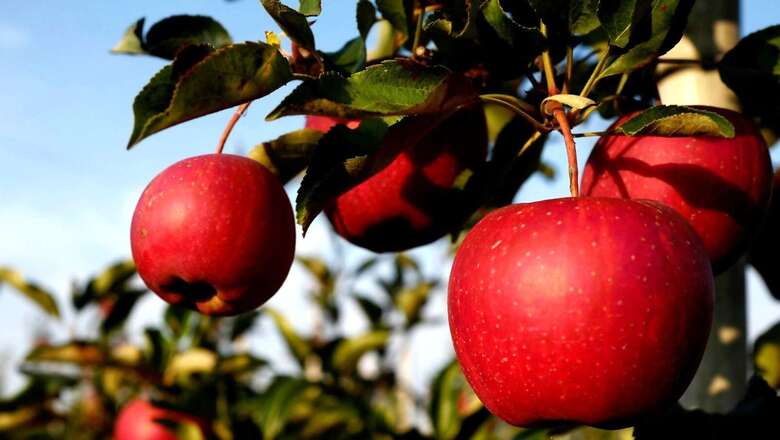
views
Kashmiri apple farmers have seen a revenue windfall ever since switching to high-density plantation of imported root stocks from The Netherlands and Italy.
At many places in South Kashmir, including Shopian, Pulwama and Kulgam, hundreds of farmers have axed traditional orchards and set up new ones, planting dwarf and imported varieties of apples, in a bid to increase yield and the quality of the fruit. In the last five years, the switch has been a rage among farmers.
With an eye on the new trend and to help farmers who have smaller land holdings and little finances, the Jammu and Kashmir government has now rolled out a five-year ambitious scheme that is expected to double, even triple, their incomes.
The scheme, called Modified High-Density Plantation, was launched recently by Jammu and Kashmir Lieutenant Governor Manoj Sinha’s administration in collaboration with National Agricultural Cooperative Marketing Federation of India Ltd (NAFED). Under the scheme, imported root stocks can be availed by farmers on subsidy along with easy loans to improve the quality and yield in their orchards and also to spend negligible amount on weeds and pesticides, besides early bearing of disease-free fruit.
Over the next five years, the J&K horticulture department will cover 5,500 hectares of land — 500 hectares in 2021 and 1,000 each in next four years — to encourage farmers to go for high-density plantation of apples. Same innovations are there for walnut, almond, cherry, mango, litchi and olive.
“The modified high-density plantation scheme has been started with the objective of enhancing production and productivity, and raising farmers’ income,” Ajaz Ahmad Bhat, Director General, Horticulture Department told News18.
Experts say the high-density plantation would accommodate 10 to 12 times more plants in a designated area. For example, 3,333 apple stocks can be grown in one hectare of land as compared to only 250 traditional stocks. As far as the yield goes, 60 metric tonnes would be achieved as against only 12 metric tonnes in case farmers adopt the new scheme. Moreover, it ensures better quality, less cull and early bearing of fruit.
“While a traditional apple plant bears fruit after seven years, the new stocks start bearing fruit from second year only. Further, the maintenance of these plants is much cheaper and easier,” added Bhat.
He said the scheme is farmer-friendly and the government is offering subsides in funding to encourage them. Under the scheme, the funding or financing pattern between the government and farmer is 50:50, meaning there would be 50% subsidy from government, 40% loan availed through a bank (which is optional) and only 10% needs to be contributed by the farmer at the time of taking up the scheme.
For example, a farmer who owns a hectare of land and wants to avail the scheme to especially plant material – 3,333 saplings — would have to shell out only Rs 3.47 lakh, while the rest Rs 13.20 lakh can be given as a loan to the farmer at the time of its commissioning. The farmer is then given four years (incubation) during which experts provide him technical and scientific advice to set up a successful orchard.
From fourth year onwards, he starts to pay back the loan with meagre interest. “The capitalisation of interest is for three years and repayment in yearly instalments from fourth year and onwards in case the beneficiary has taken loan from any bank or financial institution,” said Bhat.
He added that to attract young farmers to avail the scheme, he has to quote success stories and even take the reluctant parties to orchardists who have done well. One of these success stories is Altaf Ahmad Lone, a young farmer from Pattan area. Lone had opted for the high-density plantation in 2019 on his five kanal land, planting 800 exotic varieties of Red Velox, Gala Red Lum, Grany Smith and Golden Renders.
After only two years, he could grow 5 metric tonnes of quality apples with a turnover of Rs 4 lakh, and this year the production has shot up to 8.5 metric tonnes with an earning of Rs 8 lakh. Lone has now decided to establish another 5 kanal orchard.
Similarly, Nisar Ahmad Bhat of Midura in Tral, set up a high-density apple nursery on 8 kanals keeping in view the high demand for the root stocks in 2015. In 2019, he produced 40,000 plants with revenue generation of Rs 26 lakh. The next two years saw him produce 45,000 and 50,000 plants, with the revenue rising to Rs 30 lakh to Rs 35 lakh, respectively.
Salimullah Bhat owned two hectares of land on a hill in Pampore in Pulwama district and could not do much with it. In 2019, he approached the horticulture department. Experts advised him to go for an apple nursery. In 2019, he produced 18,000 saplings generating a revenue of Rs 11 lakh.
Two years since, he has taken the production to 38,000 saplings and annual earning to Rs 23 lakh. His earnings are expected to further go up in the next five years.
“By switching to better stocks and adhering to latest horticulture techniques, the farmers profit is only going to two to three-fold,” said Bhat.
These are interesting times, he added.
Read all the Latest India News here



















Comments
0 comment